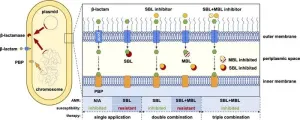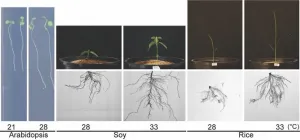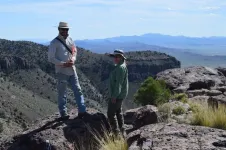(Press-News.org) It’s often said we can’t control the weather. But what if the weather controls how and when we invest our money? More specifically, what if the skies control how much we’re willing to gamble in the stock market?
New research by the University of South Australia has found a connection between pleasant weather conditions and higher investment in lottery-like stocks.
Lottery-like stocks are cheap compared to other stocks and, like lottery tickets, they can be seen as an opportunity to make a substantial gain. However, the chance of a higher return is minimal, and it’s therefore considered a high-risk investment. A study by UniSA finance researchers discovered that when the weather is sunny and skies are blue, investors are more likely to engage in these types of investments.
Dr Reza Bradrania, Senior Lecturer of Finance and member of UniSA’s Centre for Markets, Values and Inclusion, says studies in psychology have shown that weather has a significant effect on human moods and behaviour. It can explain about 40% of daily variation in moods and sunshine in particular can have a large impact on how we feel.
“Since being in a good mood spurs people to take more risks, we were curious to see if weather, as an important factor that impacts human moods, relates to demand for lottery-like stocks which are highly risky and have lottery features like casino or lotto products,” Dr Bradrania says.
“The idea is that investors who are in a good mood because of sunny weather tend to have more optimistic expectations or beliefs about the future payoff of lottery stocks. This investigation was important as it has implications on how weather can influence investors’ judgements and choices and in particular impact their financial decisions.”
“To our knowledge this is the first study of its kind to investigate how weather plays a role in our investment decisions and in particular the demand for and the performance of lottery-like stocks which have implications for financial markets.”
Dr Bradrania and PhD student Ya Gao gathered 36 years’ worth of weather data including hourly sky cloud cover, wind speed rate, rain depth and air temperature from major weather stations across US cities. Price data of common stocks from over this period (1983 to 2019) was also examined.
”We found that on days with pleasant weather conditions, investors were more likely to be risk-taking and optimistic and invest more in lottery-like stocks, which further results in high demand and higher price for these stocks. However, their price is adjusted later, which resulted in significant loss,” Dr Bradrania says.
“Overoptimism is associated with overconfidence in many cases and investors who are overconfident tend to trade lottery-like stocks more. The research suggests weather relates to gambling preference and influences our judgment and choices. It also provides some guidance on investment decisions depending on weather conditions.”
END.
…………………………………………………………………………
Media contact: Melissa Keogh, Communications Officer, UniSA
M: +61 403 659 154 E: Melissa.Keogh@unisa.edu.au
Researcher contact: Dr Reza Bradrania, Senior Lecturer of Finance, UniSA,
E: Reza.Bradrania@unisa.edu.a
END
Sunshine spurs spending: Investors bet big on sunny days
2024-06-04
ELSE PRESS RELEASES FROM THIS DATE:
Novel triple antibiotic combination offers breakthrough in combatting antibiotic resistance
2024-06-04
In the ongoing battle against antibiotic resistance, a new study published in Engineering by Zhuoren Ling’s research team unveils a promising triple combination of antibiotics that significantly expands our arsenal against drug-resistant bacteria. Titled “The Triple Combination of Meropenem, Avibactam, and a Metallo-β-Lactamase Inhibitor Optimizes Antibacterial Coverage Against Different β-Lactamase Producers,” the research sheds light on a novel approach to tackle one of the most pressing global ...
Key nutrients help plants beat the heat
2024-06-04
LA JOLLA (June 4, 2024)—Global temperatures are on the rise, with experts projecting an increase of 2.7°F by 2050. Because plants cannot regulate their own temperatures, they are especially sensitive to these temperature changes. In higher temperatures, plants instruct their root systems to grow faster, creating long roots that stretch through the soil to absorb more water and nutrients. While this response may help the plants in the short term, new research suggests it’s both unsustainable for the plants and potentially ...
UTA scientists recognized nationally for inventions and innovation
2024-06-04
Researchers from The University of Texas at Arlington received 20 utility patents for their work in 2023, contributing to the University of Texas System’s overall ranking of No. 3 in the Top 100 U.S. Universities Granted U.S. Utility Patents in 2023 list.
Compiled by the National Academy of Inventors (NAI), the rankings are based on data obtained from the U.S. Patent and Trademark Office. The University of California system and Massachusetts Institute of Technology claimed the top ...
Inflight alcohol + cabin pressure may threaten sleeping passengers’ heart health
2024-06-04
The combination of alcohol plus cabin pressure at cruising altitude may threaten sleeping plane passengers’ heart health, particularly on long haul flights, suggests the first study of its kind, published online in the respiratory journal Thorax.
The duo lowers the amount of oxygen in the blood (SpO2) and raises the heart rate for a protracted period, even in the young and healthy, the findings indicate.
The higher the alcohol consumption, the greater these effects might be, particularly among older passengers and those with pre-existing medical conditions, say ...
High excess death rates in the West for 3 years running since start of pandemic
2024-06-04
Excess death rates have remained high in the West for three years running since the start of the COVID-19 pandemic, finds a data analysis of 47 countries published in the open access journal BMJ Public Health.
This is despite the implementation of various containment measures and the availability of COVID-19 vaccines, giving rise to “serious cause for concern,” say the researchers who call on governments and policymakers to thoroughly investigate the underlying causes.
The researchers wanted to gauge the effectiveness of the response to the health crisis ...
Facial thermal imaging + AI accurately predict presence of coronary artery disease
2024-06-04
A combination of facial thermal imaging and artificial intelligence (AI) can accurately predict the presence of coronary artery disease, finds research published in the open access journal BMJ Health & Care Informatics.
This non-invasive real-time approach is more effective than conventional methods and could be adopted for clinical practice to improve the accuracy of diagnosis and workflow, pending testing on larger and more ethnically diverse numbers of patients, suggest the researchers.
Current guidelines for the diagnosis of coronary heart disease rely on probability assessment of ...
New Durham University study shows selective breeding has constrained communication abilities in domestic dogs compared to wolves
2024-06-04
-With images and video-
A new study from researchers at Durham University has found that the process of domestication and selective breeding has limited the ability of domestic dogs to use facial expressions to convey affective states (emotions) as effectively as their wolf ancestors.
The research, published in Nature’s Scientific Reports, used an extended Dog Facial Action Coding System to analyse video recordings of captive wolves and domestic dogs during spontaneous social interactions and reactions to external stimuli.
The researchers identified nine distinct affective ...
Frequent mowing puts poisonous weed into survival mode
2024-06-04
By John Lovett
University of Arkansas System Division of Agriculture
Arkansas Agricultural Experiment Station
FAYETTEVILLE, Ark. — A study of the effects of mowing on a common weed has found that what doesn’t kill you can make you stronger.
A study published in Nature’s Scientific Reports has found that frequent mowing of Solanum elaeagnifolium may help create a “superweed.”
Solanum elaeagnifolium — also known as silverleaf nightshade — can be found from south Texas to South Africa and Greece, infesting fields and soaking up valuable nutrients intended for cash crops. The weed with purple flowers – sometimes white and light ...
University of Nevada, Reno team develops new vegetation mapping tools
2024-06-04
RENO, Nev. – Powerful new digital mapping tools developed by University of Nevada, Reno researchers hold promise to improve management of rangeland, particularly public lands in the far-flung Western United States.
The significant improvements in mapping of vegetation enabled by the University’s research provide managers of rangeland, ranchers as well as federal managers of public lands, with better information to make large-scale decisions to mitigate effects of grazing, wildfire and other potential disruptions.
The research ...
Unveiling how German cockroaches came to live with humans
2024-06-04
by Brooke McDonald
It turns out a common cockroach found across the globe is a pest of our own making.
In a study recently published in Proceedings of the National Academy of Sciences, Texas A&M AgriLife researchers unveiled insights into the origins of the common German cockroach, Blattella germanica.
The study, “Solving the 250-year-old ...




